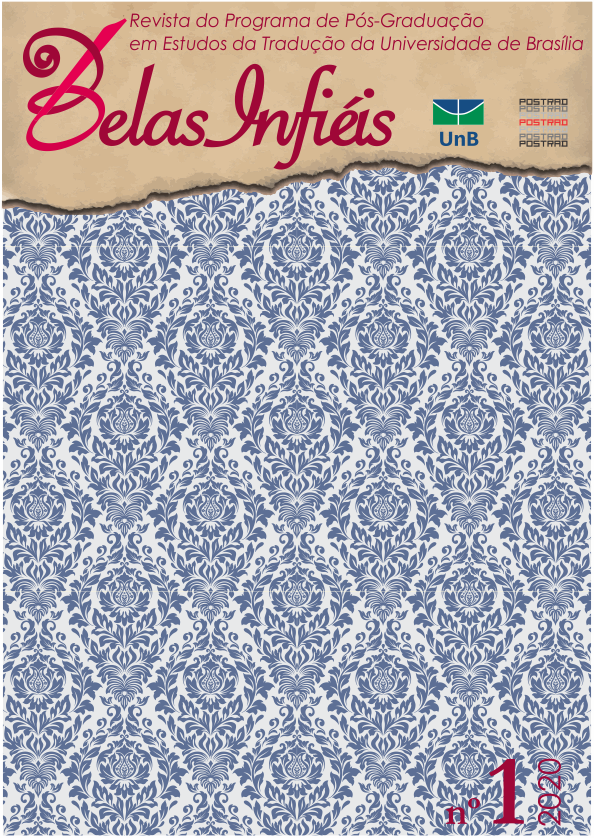Ah! Que melodia! de Arthur Schnitzler
DOI :
https://doi.org/10.26512/belasinfieis.v9.n1.2020.27081Mots-clés :
Schnitzler, Viena, MusicaRésumé
Arthur Schnitzler (1862-1931), autor vienense, foi escritor de novelas, peças de teatro, roteiros de filmes e contos. O filme De olhos bem fechados (Eyes wide shut, 1999), dirigido por Stanley Kubrick, foi baseado em Traumnovelle (1926) [Relato de um sonho] de Schnitzler. Miguel Ángel Vega Cernuda, na apresentação da sua tradução para o espanhol da novela En busca de horizontes, afirma que: “o esqueleto que mantém toda a atividade humana que Schnitzler observa é aquele mecanismo articulado composto pelo prazer de ser, pela pulsão sexual e pelo medo do inevitável deixar de ser. Esse esqueleto é o denominador comum que reduz a multifacetada humanidade vienense da época a uns quantos tipos de homem: o esteta superficial, o político venal, o hedonista amoral, o jornalista prostituído ou o lutador por ira”. Um desses tipos de homem é o personagem da história que apresentamos nesta tradução.
Téléchargements
Références
SCHNITZLER, Arthur. En busca de Horizontes. Editado e traduzido por: Miguel Ángel Vega. Madri: Cátedra, 1999. Traduzido de: Der Weg ins Freie.
VEGA, Miguel Ángel. El efecto Viena, el efecto Balzac y el efecto Freud. In: Schnitzler, Arthur. En busca de Horizontes. Editado e traduzido por: Miguel Ángel Vega. Madri: Cátedra, 1999. p. 16-17.
SCHNITLZER, Arthur. Ah, quelle melodie! In: SCHNITLZER, Arthur. Le dernier adieu. Traduzido do alemão por: Pierre Gallisaires. Paris: Union Générale d’Éditions, 1961. p. 13-17.
SCHNITZLER, Arthur. Welch eine Melodie. Spiegel. Projekt Gutenberg ”“ DE. Disponível em:
https://gutenberg.spiegel.de/buch/welch-eine-melodie-5354/1. Acesso em: 2 jan. 2020.
Téléchargements
Publié-e
Comment citer
Numéro
Rubrique
Licence
Copyright Statement
Given the public access to this journal, the texts are free to use but requires the recognition of the original authorship and initial publication in this journal to be properly stated.
The journal allows the use of works published for non-commercial purposes, including the right to submit the work to publicly accessible databases. Published contributions are the sole and exclusive responsibility of the author(s).
- When submitting papers to be evaluated by the Belas Infiéis journal, the author(s):
- Declare that the contents of the contributions are original and of their original creation, being entirely responsible for their content if there is an objection by third parties.
- Claim to be aware that they should not commit academic plagiarism.
- Declare that the manuscript has not been published, completely or partially, in Portuguese or another language. If it is a translation it should be submitted to the Translated Articles section.
- Declare that the manuscript is not being evaluated by other journals.
- Declare that the manuscript was not submitted to another journal simultaneously.
- Commit(s) to inform the journal of any kind of error or inaccuracy in their contribution (published, in evaluation or in editing) and to collaborate with the editors to make due corrections of the article (when in evaluation or editing) or erratum/retraction (after publication).
- Declare that there is no conflict of interest regarding the published work.
- Authorize its release if it is accepted for publication without any kind of monetary compensation.
- Agree to assign non-exclusive rights to publication to the magazine, remaining free to make their contribution available in other media as long as the publication of the first version in Belas Infiéis magazine is mentioned. They also authorize Belas Infiéis to assign their texts for reproduction in content indexers, virtual libraries and similar platforms.
- Maintain copyright and grant the journal the right of first publication, the work being licensed under theCreative Commons Attribution License.
- Is/Are allowed and encouraged to publish and distribute their work online after the editorial process, which may increase the impact and citation of the published work.
- Authorize the editorial team to make textual adjustments and to adapt the article to the publication rules, when necessary.



















